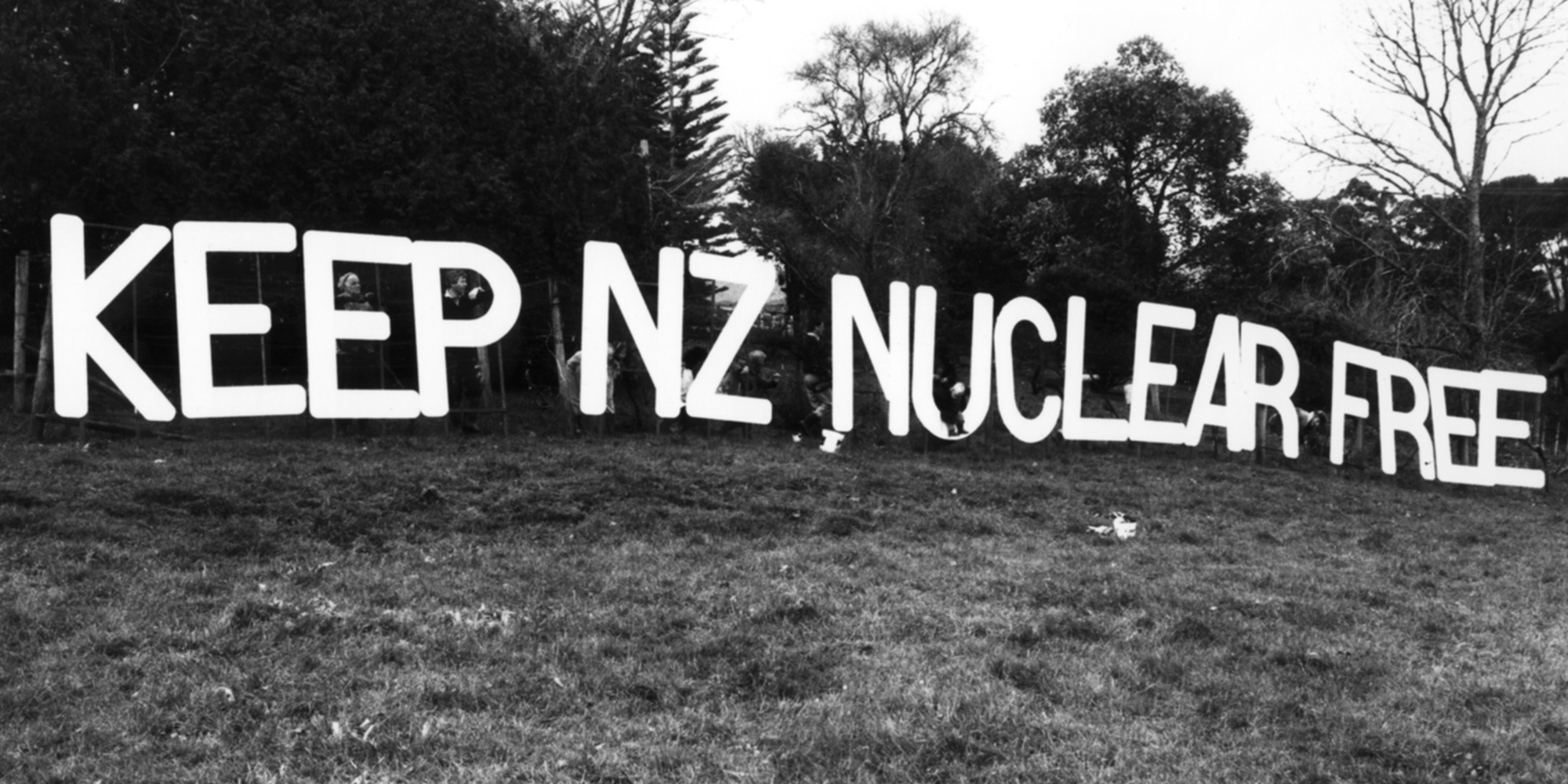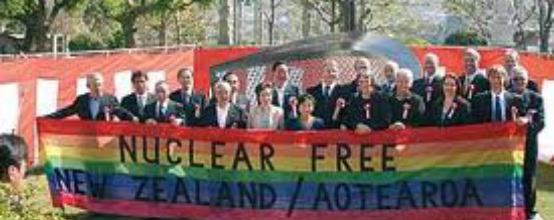
Security in the Indo-Pacific Region Rocked by
New Zealand’s Role in the AUKUS Alliance
Rt. Hon Chris Hipkins, Hon. Nanaia Mahuta and Hon. Andrew Little
Parliament Buildings
Wellington
Dear Prime Minister and Ministers,
(April 12, 2023) — The International Affairs and Disarmament Committee supports the values-based approach to foreign policy adopted by the current government and expressed in Hon. Minister Nanaia Mahuta’s Inaugural Foreign Policy Speech (February 4, 2021) which emphasizes an international rules-based order, global action on sustainability issues where solutions depend on international cooperation, and principles of manaaki, whanaunga, kaitiaki, mahi tahi and kotahitanga.
We would appreciate your response to comments and concerns we have about AUKUS, New Zealand’s relationship to this new alliance and recent government comments by Minister Little and others about New Zealand’s involvement with it. Many aspects of AUKUS appear at odds with the values-based approach of New Zealand.
In addition, we have specific concerns about AUKUS potentially undermining important non-proliferation and disarmament treaties. We share concerns about AUKUS and New Zealand being involved in it that have been expressed by former New Zealand Prime Ministers Helen Clark and Jim Bolger, former Australian Prime Ministers Paul Keating and Malcolm Fraser, and former National Party leader Don Brash.

AUKUS involves the supply of highly enriched nuclear fissile material, which means it is usable as nuclear bomb fuel, to a non-nuclear weapons state. As has been asserted by a number of independent experts, and also by the Indonesian and Chinese governments, this threatens the objectives and purposes of the Nuclear Non-Proliferation Treaty.
This is particularly the case as this fissile material will not be subject to inspections and monitoring by the International Atomic Energy Agency. Insisting on such inspections and monitoring has been crucial in endeavoring to ensure Iran does not develop the means to secure highly enriched uranium that could be used in nuclear weapons, and suggestions of a double standard have been made together with concerns about the risky precedent set.
A number of South Pacific countries, including the Cook Islands and the Solomon Islands, have also expressed concern that AUKUS could weaken the Treaty of Rarotonga, whose articles make undertakings to keep nuclear weapons and environmental pollution by radioactive matter out of the South Pacific. This Treaty is a crucial arms control measure for both them and New Zealand, and important for reducing the threat of nuclear war.
Along with these governments, we do not agree that the development and strengthening of competing military alliances, particularly nuclear alliances such as AUKUS, and further militarisation of the Indo-Pacific Region, enhance long-term security, resolve regional conflicts or provide suitable and sustainable methods of preventing war and maintaining international law. Instead, they tend to increase international tensions and generate arms races, diverting resources from health and development.
There are unresolved conflicts, military threats and other genuine security concerns in the region. However, experience has demonstrated that these are much better resolved through diplomacy and the use of common security mechanisms — such as trade agreements, disarmament treaties, the United Nations and International Court of Justice (ICJ) — rather than by military alliances.
New Zealand has many successful examples of using such common security mechanisms to resolve conflicts and enhance security — most of which involved conflicts with much more powerful countries. These include the ICJ Nuclear Tests Case, UN mediation over the Rainbow Warrior dispute with France, NZ-China Free Trade Agreement (which includes effective environmental and labour regulations) and the use of UN mechanisms to end the Indonesian violent occupation of East Timor and establish East Timor’s independence.
There have been some recent government comments, including from Defence Minister Andrew Little, about New Zealand supporting or even joining the “second pillar” aspects of the AUKUS alliance. We strongly oppose any New Zealand participation in the AUKUS alliance, at any level.

We agree with the need for New Zealand to work independently with other knowledgeable countries, including those who happen to be AUKUS members, on cybersecurity and other important digital security issues, including the emerging threats from artificial intelligence and quantum computing.
Such co-operation should be from outside the AUKUS alliance as it also needs actively to involve other countries that lead on cybersecurity issues such as France, Singapore, South Korea and Japan.
We were pleased that, when the AUKUS agreement and the nuclear-powered submarine agreement were announced, the Government made it clear that our nuclear free policy would continue to ban such vessels entering the New Zealand Nuclear Free Zone. However, being involved in an alliance dependent on the possible use of nuclear weapons makes us appear complicit and could limit our credibility in promoting arms control measures like the Treaty on the Prohibition of Nuclear Weapons.
In recent decades, New Zealand’s diplomacy and armed forces have an enviable record in restoring peace and stability in our South Pacific region of the world, such as in Bougainville. Helping reduce tension and the risk of war in both the South Pacific and the Indo-Pacific region are best pursued by New Zealand remaining non-aligned and independent of AUKUS and NATO, and instead by promoting peacemaking and constructive common security solutions to military threats and other threats that may emerge.

The Defence Review rightly emphazies emerging threats from the impacts of climate change as equally important to those arising from strategic competition in our region. Once again, on climate change, an alliance with only some of the key players is likely to be ineffective, when it needs collaboration with all of them, particularly with China and with the climate-threatened South Pacific Island states.
Acting in a way which appears to declare China our enemy would be a major mistake, when their active collaboration on climate change responses is absolutely vital. Working with them, and with other countries in our region, to solve the sources of tensions and threats is much more likely to succeed constructively than supporting a military alliance against them.
For example, as with the recent UN General Assembly resolution referring the enforcement of climate change action to the International Court of Justice, and with the 1996 Court Opinion on of the legality of the threat or use of nuclear weapons, we should be persuading all countries to accept the Court’s jurisdiction and refer more international disputes there, such as those concerning the South China Sea atolls.
Collaborative common security measures involving all participants provide more security and a greater likelihood of achieving just and lasting solutions than participating in an arms race that the AUKUS alliance is making more dangerous.
Regards,
Richard Northey, Chair
Rod Alley, Lyndon Burford, Kevin Clements, Kate Dewes, Rob Green, Liz Remmerswaal, Laurie Ross and Alyn Ware, Members — International Affairs and Disarmament Committee
C/- Richard Northey, Chair
Unit 810, 8 Hereford St
Freemans Bay, Auckland, 1011, Aotearoa-New Zealand
northeyr@xtra.co.nz; 0272479662